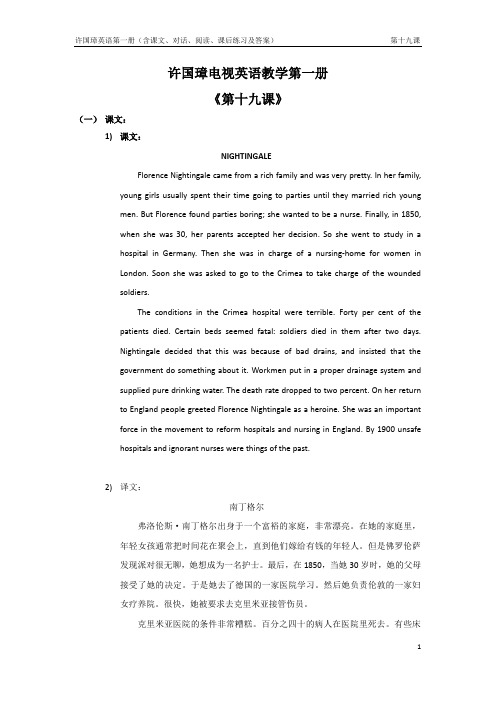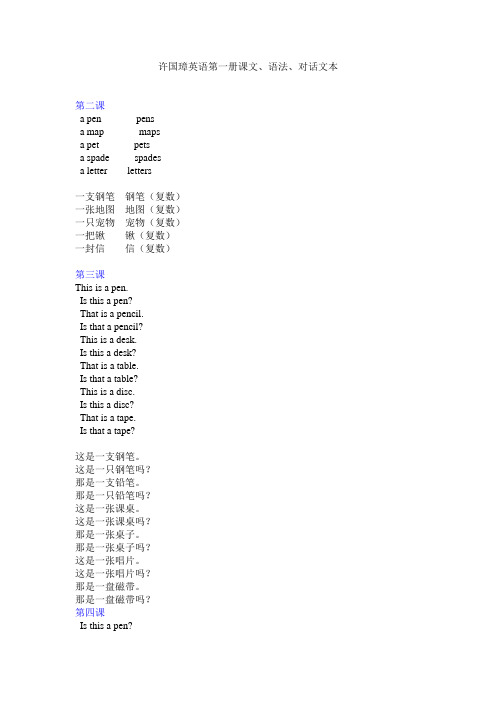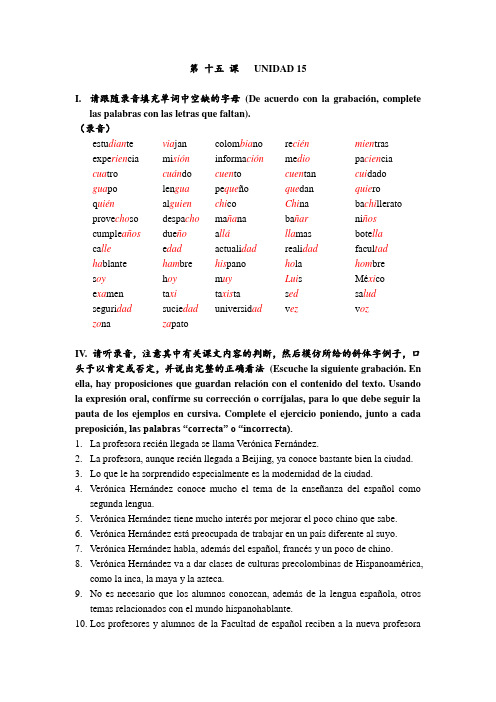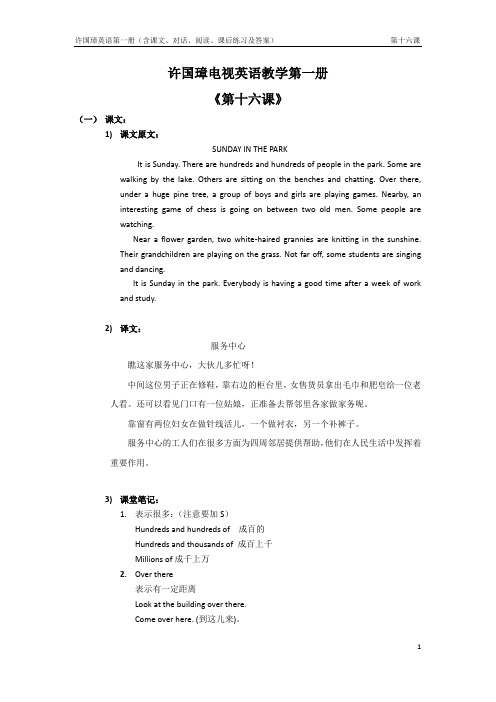许国璋英语第一册第十五课课文、对话、练习、答案
许国璋英语第一册第十九课课文、对话、练习、答案

许国璋电视英语教学第一册《第十九课》(一)课文:1)课文:NIGHTINGALEFlorence Nightingale came from a rich family and was very pretty. In her family, young girls usually spent their time going to parties until they married rich youngmen. But Florence found parties boring; she wanted to be a nurse. Finally, in 1850,when she was 30, her parents accepted her decision. So she went to study in ahospital in Germany. Then she was in charge of a nursing-home for women inLondon. Soon she was asked to go to the Crimea to take charge of the woundedsoldiers.The conditions in the Crimea hospital were terrible. Forty per cent of the patients died. Certain beds seemed fatal: soldiers died in them after two days.Nightingale decided that this was because of bad drains, and insisted that thegovernment do something about it. Workmen put in a proper drainage system andsupplied pure drinking water. The death rate dropped to two percent. On her returnto England people greeted Florence Nightingale as a heroine. She was an importantforce in the movement to reform hospitals and nursing in England. By 1900 unsafehospitals and ignorant nurses were things of the past.2)译文:南丁格尔弗洛伦斯·南丁格尔出身于一个富裕的家庭,非常漂亮。
新概念115课课文

新概念115课课文摘要:1.对话背景及人物介绍2. Graham Turner 打电话给John Smith3.沟通误会及解决问题4.告知玛丽晚餐会晚到5.结束通话正文:【1】在一天晚上的某个时刻,Graham Turner 拿起电话,想要拨打一个久未联系的朋友约翰(John Smith)的电话。
他心中充满期待,想跟老朋友分享近期的生活点滴。
然而,当他按下拨号键后,电话那头传来的声音让他产生了疑问。
【2】Graham 疑惑地问道:“Is that you, John?”(是你吗,约翰?)电话那头的John 听到这个问题,有些困惑。
他确认了一下电话显示的号码,回答说:“Yes, speaking”(是的,是我)。
【3】Graham 打电话给John 的目的是想告诉他,他们今晚一起共进晚餐的计划可能会晚一些。
于是他说:“Tell Mary we"ll be late fo r dinner this evening”(告诉玛丽,我们今晚的晚餐可能会晚到)。
然而,John 并没有立刻明白Graham 的意思,他回答说:“I"m afraid I don"t understand”(恐怕我不明白)。
【4】Graham 意识到John 可能没听懂他的话,于是他重新解释道:“I meant we"ll be late for dinner this evening, so you"d better tell her not to wait for us”(我的意思是,我们今晚的晚餐可能会晚到,你最好告诉玛丽别等我们)。
这次,John 明白了Graham 的意思,他表示感谢并答应转达这个消息。
【5】在告知玛丽晚餐会晚到的消息后,Graham 和John 结束了这次通话。
他们虽然久未见面,但这次简短的电话交流让他们感受到了彼此的关心和友谊。
他们期待着今晚的相聚,相信这次晚餐会是一次愉快的重逢。
许国璋英语第一册课文、语法、对话文本

许国璋英语第一册课文、语法、对话文本第二课a pen pensa map mapsa pet petsa spade spadesa letter letters一支钢笔钢笔(复数)一张地图地图(复数)一只宠物宠物(复数)一把锹锹(复数)一封信信(复数)第三课This is a pen.Is this a pen?That is a pencil.Is that a pencil?This is a desk.Is this a desk?That is a table.Is that a table?This is a disc.Is this a disc?That is a tape.Is that a tape?这是一支钢笔。
这是一只钢笔吗?那是一支铅笔。
那是一只铅笔吗?这是一张课桌。
这是一张课桌吗?那是一张桌子。
那是一张桌子吗?这是一张唱片。
这是一张唱片吗?那是一盘磁带。
那是一盘磁带吗?第四课Is this a pen?It is a green pen.It that a pencil? Yes, it is.It is a red pencil.Is this a desk?No, it isn't.It is a table.Is that a pick?No, it isn't.It is a spade.These are desks.Are these tables? No, they aren't.They are desks. Those are knives.Are those pencils? No, they aren't.They are knives.这是一支钢笔吗?是的。
这是一支绿色的钢笔。
那是一支铅笔吗?是的。
那是一支红色的铅笔。
这是一张课桌吗?不,不是。
它是一张桌子。
那是一把镐吗?不,不是。
它是一把锹。
这些是课桌。
这些是桌子吗?不,不是。
新现西1册课后答案 第15课

第十五课UNIDAD 15I. 请跟随录音填充单词中空缺的字母(De acuerdo con la grabación, completelas palabras con las letras que faltan).(录音)estu dian te via jan colom bia no re cién mien trasexpe rien cia mi sión informa ción me dio pa cien ciacua tro cuán do cuen to cuen tan cui dadogua po len gua pe queño que dan quie roq uién al guien chi co Chi na ba chi lleratoprove cho so despa cho maña na bañar niñoscumple años dueño a llálla mas bote llaca lle e dad actuali dad reali dad facul tadha blante ham bre his pano ho la hom bres oy h oy m uy Lui s Méxi coe xa men ta xi ta xis ta s ed sa ludseguri dad sucie dad universid ad v ez v ozzo na za patoIV. 请听录音,注意其中有关课文内容的判断,然后模仿所给的斜体字例子,口头予以肯定或否定,并说出完整的正确看法(Escuche la siguiente grabación. En ella, hay proposiciones que guardan relación con el contenido del texto. Usando la expresión oral, confírme su corrección o corríjalas, para lo que debe seguir la pauta de los ejemplos en cursiva. Complete el ejercicio poniendo, junto a cada preposic ión, las palabras “correcta” o “incorrecta). profesora recién llegada se llama Verónica Fernández. profesora, aunque recién llegada a Beijing, ya conoce bastante bien la ciudad.3.Lo que le ha sorprendido especialmente es la modernidad de la ciudad.4.Verónica Hernández conoce mucho el tema de la enseñanza del español comosegunda lengua.5.Verónica Hernández tiene mucho interés por mejorar el poco chino que sabe.6.Verónica Hernández está preocupada de trabajar en un país diferente al suyo.7.Verónica Hernández habla, además del español, francés y un poco de chino.8.Verónica Hernández va a dar clases de culturas precolombinas de Hispanoamérica,como la inca, la maya y la azteca.9.No es necesario que los alumnos conozcan, además de la lengua española, otrostemas relacionados con el mundo hispanohablante.10.Los profesores y alumnos de la Facultad de español reciben a la nueva profesoracon mucho cariño.11.El profesor recién llegado se llama José González. Es colombiano.12.Liu Yang ya lleva varios años estudiando español.13.Liu Yang y sus compañeros ya pueden hablar normalmente en español con elprofesores hispanohablante.14. A Liu Yang le interesa mucho recibir clases de un profesor hispanohablante.15. El profesor José González piensa hablar con el decano para que no le asigne eldictado de clases (授课)en el primer curso.16. JoséGonzález quiere plantear este problema al decano porque le parece muydifícil enseñar a alumnos que no saben nada de español.17. Liu Yang no se va a poner nervioso frente(面对) al profesor González, en la clase,porque ya lo conoce.18. El profesor colombiano está dispuesto a invitar a sus alumnos a su casa los finesde semanas para que ellos practique el español con élClave1.Incorrecta. La profesora recién llegada se llama Verónica Hernández.2.Incorrecta. Recién llegada a Beijing, la profesora solo conoce algunos aspectos dela ciudad.3.Correcta. Lo que le ha sorprendido especialmente a Verónica Hernández es lamodernidad de la ciudad.4.Correcta. Verónica Hernández es especialista en la enseñanza del español comosegunda lengua.5. Correcta. Por eso Verónica Hernández piensa salir a la calle y hablar con la gente.6. Incorrecta. Verónica Hernández está alegre de tener un primer contacto docentecon un medio cultural diferente.7. Correcta. Verónica Hernández, domina bastante bien una lengua extranjera, elfrancés y un poco de chino.8. Incorrecta. Ella solo va a hablar en clase sobre algunos temas de Historia deAmérica Latina, porque conoce bastante bien las culturas precolombinas.9. Incorrecta. No solo es necesario que los alumnos estudien la lengua española,sino que también adquieran otros conocimientos relacionados con el mundo hispanohablante.10. Correcta. Los profesores y alumnos de la Facultad de español reciben a la nuevaprofesora con los brazos abiertos.11. C orrecta. El profesor que acaba de llegar se llama José González. Es colombiano.12. Incorrecta. Liu Yang solo lleva un semestre estudiando español.13. Incorrecta. Liu Yang y sus compañeros son todavía estudiantes del primer curso.Solo saben decir muy pocas cosas en español.14. Correcta. A Liu Yang le interesa mucho que un profesor hispanohablante le déclases. Cree que puede ser una experiencia fascinante.15. Incorrecta. José González tiene mucho interés en enseñar a los estudiantes delprimer curso.16. Incorrecta. Al contrario (正相反), piensa que puede ser una experienciaenriquecedora ver cómo se aprende el español desde el comienzo.17. Correcta. Es verdad: ya lo conoce un poco. Sabe, por eso, que no se va a ponernervioso. .18. Correcta. El interés que tiene el profesor colombiano en enseñar español a susalumnos chinos es muy grande. Eso se ve en la amabilidad que tiene de invitarlosa su casa para que practiquen hablando con él.V. 请用下列各组单词造句, 注意应有的形态变化,并增添所需的小品词,然后译成汉语(Forme oraciones con las series numeradas de palabras cambiando lo que haya que cambiar y agregándolas partículas necesarias. Luego, tradúzcalas al chino):1.Es imposible aprender una lengua extranjera sin practicarla.Es imposible que aprendáis una lengua extranjera sin practicarla.2.Es mejor pronunciar el discurso en españolEs mejor que pronuncies el discurso en español3.Es provechoso conocer medios culturales diferentes.Es provechoso que conozcamos medios culturales diferentes.4.Está bien asignar a la profesora García al segundo curso.Está bien que el decano asigne a la profesora García al segundo curso.5.No está mal hablar un poco de tu experiencia docente.No está mal que hables un poco de tu experiencia docente.6.Los libros son importantes pero, para conocer de cerca la cultura de un país, esnecesario vivir en él.Los libros son importantes pero, para conocer de cerca la cultura de un país, es necesario que vivamos en él7. Es importante organizar cursos de verano para estudiantes extranjeros.Es importante que organicéis cursos de verano para estudiantes extranjeros.8. Es útil tener estas informaciones profesionalesEs útil que ustedes tengan estas informaciones profesionales.9. Está bien encargar esa misión a Dolores.Está bien que encargues esa misión a Dolores.10. Es difícil encontrar al decano en su oficina.Es difícil que encontremos al decano en su oficina.VI. 请将括号中的动词变为适当的人称和时态。
许国璋英语第一册第十三课课文、对话、练习、答案

许国璋电视英语教学第一册《第十三课》(一)课文:1)课文原文:A DAY AT COLLEGEWang Qing gets up very early. He dresses, washes, and goes out to do exercises in the fresh morning air. Then he has breakfast.For most of the morning he attends lectures or practices his English. After class hereads in the library or reviews his lessons.Lunch is at twelve. After lunch Wang Qing takes a nap. In the afternoon he doeshis homework and reads the newspaper. Then he has an hour for sports. He runsround the track or plays ball games.After supper he often goes for a walk in the college gardens. Sometimes he listensto the English broadcast. He goes to bed at half past ten.2)新单词:3)课文译文:校园一日王清起得很早。
他穿好衣、洗完脸,就走到室外,在清爽的晨风中做早操,然后去吃早饭。
上午的大部分时间他听课或者练习英语,课后他到图书馆看书,或者复习功课。
12点吃午饭,饭后王清休息一会儿。
下午他做作业、看报纸,随后有一小时的体育活动时间,他或者沿跑道跑跑步或者打打球。
晚饭后他常常去学校花园里散步,有时还收听英语广播。
晚上他预习功课,10点半睡觉。
综合英语一上册第十五课lessonfifteen

综合英语一上册第十五课lessonfifteenLesson FifteenUnreality of TvUnreality 不真实(性)Reality 现实Violence 暴力Present 显示,展现;描述Show 节目,表演Television show 电视节目Show 上演(戏剧等),放映(电影等)Park 停放(车子等)Very 真正地,完全地Back 使倒退,使后退;倒退,后退Available 可得到的,可利用的,现成的Block 街区,建筑群Distorted 被歪曲的,被曲解的Doorman 门卫Screen 荧屏,屏幕Nonsense 胡说八道,废话;无意义的话或行为Rain-swept 大雨滂沱的Gangster 匪徒,歹徒Kid (口语)小孩;年轻人Bandage 用绷带包扎Defend 为……辩护Defendant 被告Innocent 无罪的,无辜的Plead (法律)辩解Guilty 有罪的,内疚的D.A. 地方检察官Harm 损害,伤害Harmful 有害的Advertisement 广告Mouthwash 漱口剂,洗口药Mate 伴侣Useful ExpressionsNot….but.. 不是……,而是Not only … but (also) 不但……而且Cite an example 引用一个例子,举例On the first try 第一次尝试Think of 考虑,想想,想到,想起Grow up 长大,成长Get into trouble 陷入困境,招惹麻烦Keep up with 赶上,跟上Be innocent of 没犯……罪Make a deal (with) 做交易,达成协议Cannot afford sth./ to do 没有足够的(钱,时间)做……Do harm/good to 对……有害(或益)Lead sb. (on) to do 影响某人使其做某事Advertisements often lead people (on) to buy things they don’t need.Had better (do) 应该做某事;最好做某事You’d better go and see a doctor right now.You’d better not tell him about it.What …is /looks like ……是何物,……是什么样子My grandfather never knew what a violin looked likeTell me what your home village is like.Pay…down/ pay down 付押金;付定金;即刻支付They can buy the car by paying 10% down and the rest within two years.Translate1)他第一次尝试就成功了He succeeded on the very first try.2)我非常想念你,时常想起你I miss you very much and always think of you.3)你若在违反法律,你会惹出大麻烦的.If you break the law again, you will get into trouble.4)在国外,他们每天读报来跟上国内形势.5)大家都认为他没有犯谋杀罪.Everyone thought that he was innocent of the murder.6)这两家公司在经过长时间的讨论后达成了协议.Having discussed for a long time, the two companies madea deal.7)在那个村庄现在还有人买不起电视机.In that village, there are still s ome people who can’t afford to buy TV sets.8)躺在床上看书对你的眼睛是有害的.Reading on the bed will do harm of your eyes.9)你最好举出一个例子来证明你的观点.You had better cite a example to prove your viewpoint.10)一个国家的问题往往对全球产生巨大的影响.A problem in one country usually leads to a great effect on the world.11)那年他不仅给家乡修建了一所学校,.That year he not only built a school for his hometown, but also to the people of a flooded area.12)消费者常常受误导,结果买的东西往往超过所需.Consumers are often misled to buy things they don’t need.21)我们都叫他弗兰克.All of us call him Frank2)他证明自己是一个好司机.He has proved himself a good driver.3)学生们认为他是一个好老师.The students consider ed him a good teacher.Questions on the text1)What study did Dr. Applebaum complete recently?Recently he completed a study on the effects of television on children.2)According to him what is the greatest danger of television?The greatest danger of television is that it presents a world to children that doesn’t exist, and leads them to expect things that never happen.3)What was the first example he gave to show that TV presented a distorte d picture of theworld?The first example is that we have never seen a television show where a person in a car doesn’t immediately find a parking place on the very first try.4)It is easy to get a taxi driver in real life, isn’t it? What about the situation on the screen?No, it isn’t.Whenever a person walks out of a restaurant or office building and says to the doorman, ‘get me a taxi’ the taxi immediately arrives.5)Have you ever told a taxi driver to follow a car? Do a lot of people do so? What do we find onthe screen?No, I haven’tNo, they don’tOn TV every taxi driver looks as if he had nothing better to do than to drive 90 miles an hour through rain_swept street trying to keep up with a carful of gangsters.6)What picture do children get about emergency wards on TV?Kids have a false sense of what emergency wards of hospitals are really like. On TV it shows they take a kid to an emergency ward and four doctors come rushing down to bandage his leg. There always happens to be a hospital bed available when a kid needs it.7)What lies does TV tell about lawyers? What is the situation like in real life?On the screen the lawyer spends day and night looking for evidence to prove the person is innocent.In real life th e lawyer would stay he can’t afford to find that time out.8)Which is doing more harm to children according to Dr. Applebaum, the violence on the screenor the unreality?9)Advertisements give a distorted picture of the real world, too, don’t they? Can you give anexample?Yes, they do.Children are led to believe that when they grow up if they use a certain mouthwash they’ll find the mate of their dreams.10)Do our TV programs have the same problem?No, sometimes they are different.11)In what way are they different from American TVprogrammes?Educational programs for children are different, for they are instructive.12)Do you think TV is doing more harm than good or more good than harm to children?I think it is doing more good than harm.。
新概念英语口语第一册 Lesson 15-1 At the Customs 在海关(1)

新概念英语口语第一册 Lesson 15-1 At theCustoms 在海关(1)经典对话 (A=Clerk B=Lin Hao)A:Hello. Kennedy International Airport. Good morning! May I help you?A:你好。
这里是肯尼迪国际机场。
早上好!请问需要什么协助?B:Hello! I'd like to book a flight to London on April 9th.Is there a flight at11:00 a. m. ?B:您好!我想预订4月9号到伦敦的机票。
请问上午11点有航班吗?A:One second, please. I'll have a look at the time tablefor you. Sorry, that non-stop flight you want is fully booked,but you can catch a UA Flight UA-1699 via Paris at 9:00 a.m.A:请稍等,我为您查一下时刻表。
很抱歉,您要的直达航班已经预订满了。
不过,您能够乘坐经停巴黎的美联航班UA-1699次,上午9点起飞。
B:To have a stopover in Paris before getting to London, right?B:是不是到伦敦之前,在巴黎停留一下?A:That's right,sir. But you won't have to change planes.A:是的,先生。
但是不需要换机。
B:Okay. Flight UA-1699 will be fine.B:好吧。
那就订UA-1699次航班了。
A:Do you want to travel first class or economy class?A:头等舱还是经济舱?B:Economy class.B:经济舱。
许国璋英语第一册第十六课课文、对话、练习、答案(2)

许国璋电视英语教学第一册《第十六课》(一)课文:1)课文原文:SUNDAY IN THE PARKIt is Sunday. There are hundreds and hundreds of people in the park. Some are walking by the lake. Others are sitting on the benches and chatting. Over there,under a huge pine tree, a group of boys and girls are playing games. Nearby, aninteresting game of chess is going on between two old men. Some people arewatching.Near a flower garden, two white-haired grannies are knitting in the sunshine.Their grandchildren are playing on the grass. Not far off, some students are singingand dancing.It is Sunday in the park. Everybody is having a good time after a week of work and study.2)译文:服务中心瞧这家服务中心,大伙儿多忙呀!中间这位男子正在修鞋,靠右边的柜台里,女售货员拿出毛巾和肥皂给一位老人看。
还可以看见门口有一位姑娘,正准备去帮邻里各家做家务呢。
靠窗有两位妇女在做针线活儿,一个做衬衣,另一个补裤子。
服务中心的工人们在很多方面为四周邻居提供帮助,他们在人民生活中发挥着重要作用。
3)课堂笔记:1.表示很多:(注意要加S)Hundreds and hundreds of 成百的Hundreds and thousands of 成百上千Millions of成千上万2.Over there表示有一定距离Look at the building over there.Come over here. (到这儿来)。
- 1、下载文档前请自行甄别文档内容的完整性,平台不提供额外的编辑、内容补充、找答案等附加服务。
- 2、"仅部分预览"的文档,不可在线预览部分如存在完整性等问题,可反馈申请退款(可完整预览的文档不适用该条件!)。
- 3、如文档侵犯您的权益,请联系客服反馈,我们会尽快为您处理(人工客服工作时间:9:00-18:30)。
许国璋电视英语教学第一册《第十五课》(一)课文:1)课文原文:A SERVICE CENTERLook at this service center. How busy everybody is!The man in the middle is mending shoes. At a counter on the right, a woman isshowing an old man a towel and some soap. We see a girl at the door. She is going tohousework for the families in neighborhood.Two women are sewing by the window. One of them is making a shirt and theother is making a pair of trousers.The workers at the service center help their neighbor in many ways. They play an important part in people’s life.(二)DIALGUE:(对话)1)原文:IN THE COMPUTER ROOM-Is this your school computer room? Who are these people?-They are students of the Russian department.-What are they doing?-They are learning to use computers.-Do you often work her?-Yes ,we work here once a week. We are all keen to learn modem techniques.(三)新单词:(四)译文:1)课文译文:服务中心瞧这家服务中心,大伙儿多忙呀!中间这位男子正在修鞋,靠右边的柜台里,女售货员拿出毛巾和肥皂给一位老人看。
还可以看见门口有一位姑娘,正准备去帮邻里各家做家务呢。
靠窗有两位妇女在做针线活儿,一个做衬衣,另一个补裤子。
服务中心的工人们在很多方面为四周邻居提供帮助,他们在人民生活中发挥着重要作用。
2)对话译文:在计算机房—这是你们学校的计算机房吗?这些人是谁?—他们是俄语系的学生。
—他们在干什么呢?—他们正在学习使用计算机。
—你们经常来这儿学习吗?—是的,我们每周在这里上一次课。
我们都喜欢学习现代化的技术。
(五)EXERCISES:1)回答问题:1.There are many people in the picture, aren’t there? How many people are therein it ?Yes, there are. There are six people in it.2.Who are these people? Are they very busy?They are worker of service center and customer. They are very busy.3.Who is sitting in the middle? What is he doing?The man is sitting in the middle. He is mending shoes.4.What do you see on the right? What is the woman doing?I see a women and an old man. The woman is showing an old man a towel andsome soap.5.Is there anyone near the door? Is she going out ? what is she going to do ?There is a girl near the door. She is going out to do homework for the families inthe neighborhood.6.What are the women doing by the window?They are sewing.7.How do the comrades at the service center help their neighbors?The works in the service center help their neighbors in many ways.8.They play an important part in socialist construction, don’t they?Yes, they do .9.Do you often do physical labor?Yes, I do.10.Where do you usually work?We usually work In the farm.11.Is there any farm in your college? What do you usually do in farm?Yes, there is . we usually after class go to the farm work.12.Do you sometimes work in a factory? In what factory do you work?Yes, I do. My job is to mend the machine.13.Are you all active in physical labor?Yes, we are .2)写出下列音词现在进行时和第三人称3)中译英:4)用下面词造句,再变为疑问句和否定句:1.Write (a letter, a slogan, a report, etc.)The girl is writing a letter.Is the girl writing a letter?Who is writing a letter?2.Do (an exercise, homework, morning exercises, etc .)3.Have (breakfast, a meeting, a rest, etc.)4.Make (a plan, supper, a pair of shoes, etc.)5)就划线部份提问:1.The girls are washing their clothes in the washroom.What are the girls doing in the washroom?Where are the girls washing their clothes?2.The students are having a meeting in Room 201.Who are having a meeting in Room 201?Where are the students having a meeting?3.They are going to work in the Machine –Building Plant on Tuesday after noon.Where are they going to work?When are they going to work in the Machine-Building?4.The peasant are going to plant cabbages next week.Who are going to plant cabbages next week?When are the peasant going to plant cabbages?5.She is going to help Wu Ming to review her grammar this evening.What is she going to do?What is she going to help Wu Ming?When is she going to help Wu Ming to review her grammar?6)用所给词汇仿照例句谈话。
-Is Comrade Wang reviewing her lessons?-No, she isn’t.-What is she doing?-She is doing her grammar exercises.-Are you going to review your lessons this afternoon?-No, I’m not.-What are you going to do ?-I’m going to do some grammar exercises.7)中译英:1.团支书在准备功课吗?-不,他在帮助王清订学习计划。
Is League Secretary preparing his lessons?No, he isn’t. He is helping Wang Qing make a study plan.2.四班同学在哪里?-在教室里,在开会。
Where is there students of Class Four?They is meeting in classroom.3.他们在上什么课?- 他们在上党史课,他们每次星期四下午上党史课。
What are they attending class?They are attending the history of Communist Party of Chinese. Every timeThursday they will have.4.房里有两个小女孩,一个在看连环画(picture-book),别外一个在做一朵纸花。
There are two girls in the room, one of them is reading a picture-book, theother is make a flower of paper.5.请你把你们的新课本拿给我看看。
Please show me your new textbook.6.这儿有(here are )两张照片。
在一张里面学生们在帮助农民种白菜。
看他们工作多紧张!在别一张照片里,学生们在劳动之后在休息。
两个女学生在跳舞,别的学生的鼓掌(chap).新中国的学生常常到农村(countryside)劳动,他们都积极参加体力劳动。
